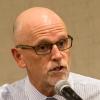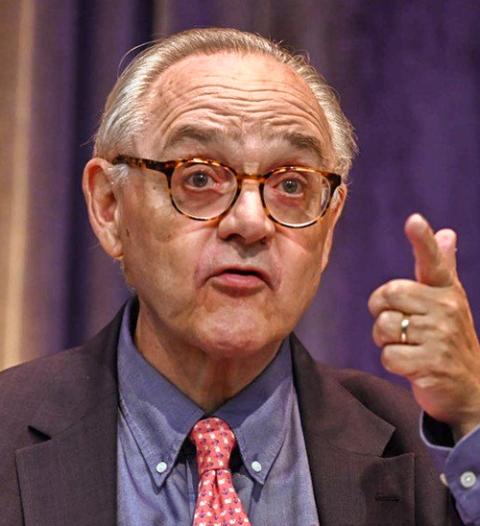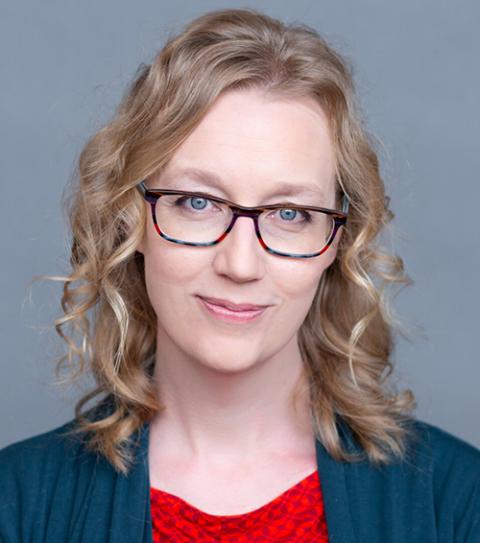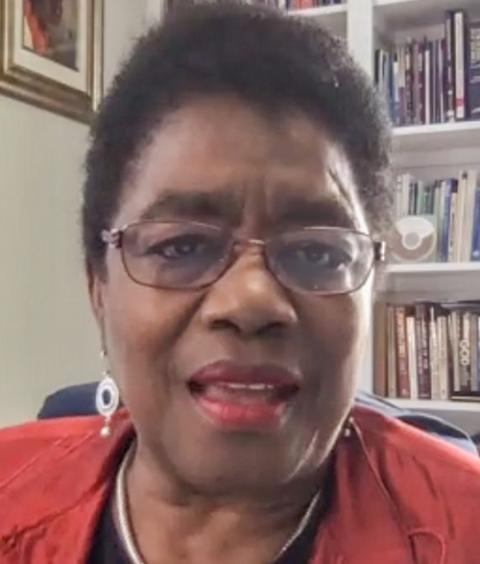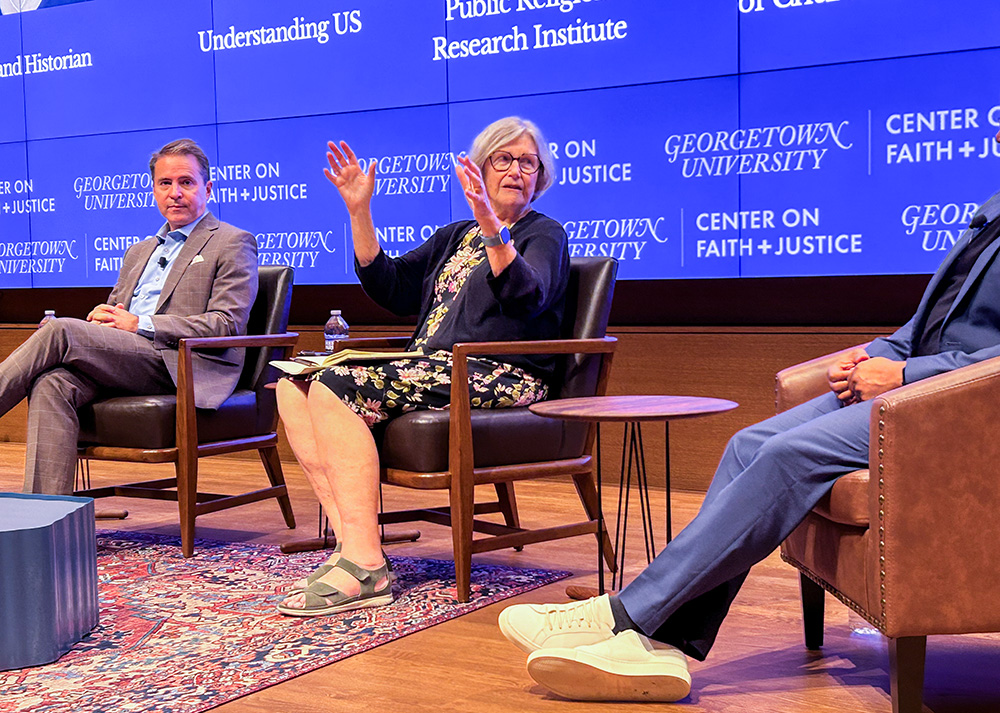
Robert Jones (left) of the Public Religion Research Institute and Social Service Sr. Simone Campbell of Understanding US speak at the September conference "Test of Faith: A Summit to Defend Democracy," hosted by the Center on Faith and Justice at Georgetown University. (David DeCosse)
A group of Catholic and Protestant scholars, church leaders and activists issued a public letter urging Christians in the United States and around the world to defend democracy against intensifying authoritarian threats.
They also met for two days at a summit in Washington to discuss the letter's key points.
"We face a crisis of democracy and a test of faith in this country," said Jim Wallis, the noted Protestant author and one of the lead organizers of the ecumenical effort behind the creation and release of the letter: "There must be a theological response."
The letter was drafted in the last few months by a group of Catholics, mainline Protestants, evangelical Christians and Orthodox Christians. Catholics involved in the effort included Jesuit theologian Fr. David Hollenbach of Georgetown University; theologian and legal scholar Cathleen Kaveny of Boston College; Washington Post columnist E.J. Dionne; University of Virginia Professor Nichole Flores; and prominent activist Social Service Sr. Simone Campbell.
The letter was made public and available for signature Sept. 19 at the start of a two-day conference in Washington, D.C., called "Test of Faith: A Summit to Defend Democracy." Georgetown University's Center on Faith and Justice (where Wallis is director) hosted the conference.
An ethos, not an ethics
Republican presidential candidate and former President Donald Trump's name appears nowhere in the document and he was hardly mentioned at the "Test of Faith" conference. Wallis and others involved in the letter rejected a spirit of partisanship and noted that as Christians they held widely different views on the most contested policy questions in American politics.
Advertisement
The point of the effort, they said, was not to address issues but to articulate and defend a set of Christian theological convictions that provide a justification for constitutional democracy.
They said their aim was to help uphold legal structures like voting rights and cultural practices like truth-telling as foundations of democracy. Christian Orthodox theologian Aristotle Papanikolaou of Fordham University, a member of the drafting team, said the letter is "not an ethics; it's an ethos."
The letter also does not claim that Christianity is the only basis for democracy. Instead, it understands that its Christian principles have broad affinities "across many religious and ethical traditions and [with] people of good will." In taking an approach that sees the Christian story of democracy as distinct but deeply connected to the broader public, the letter represents a major shift from the sectarian conservative Catholic and evangelical Christian public theology of the last years.
Nor does the letter claim that Christianity has always affirmed democracy. Dionne and Hollenbach both noted in their talks that the 1962-65 Second Vatican Council represented the moment of no-turning-back in the Catholic embrace of democracy. But the path to that point was exceptionally rocky.
As Franciscan Fr. Kenneth Himes explained in his book Christianity and the Political Order, the Catholic Church was adamantly opposed to the idea for centuries. For much of the 19th century, popes and Catholic aristocrats warned of democratic threats to the appointment of bishops and the moral quality of society. But more positive streams of Catholic political thought and the devastation of the Second World War prompted a wholesale change of course.
In his Christmas message from 1944, Pope Pius XII considered the compatibility between the God-given dignity of the human person and the norms of equality and participation at the heart of democracy. He declared: "The democratic form of government appears as a postulate of nature imposed by reason itself."
Twenty-one years later, at the Second Vatican Council, the document Gaudium et Spes said, in a democratic key, that "it is in full conformity with human nature that there should be juridico-political structures providing all citizens ... the practical possibility of freely and actively taking part in the establishment of the juridical foundations of the political community."
In addition, in the conciliar Declaration on Religious Freedom, the assembled bishops affirmed the human right to religious freedom, a cornerstone of constitutional democracies around the world.
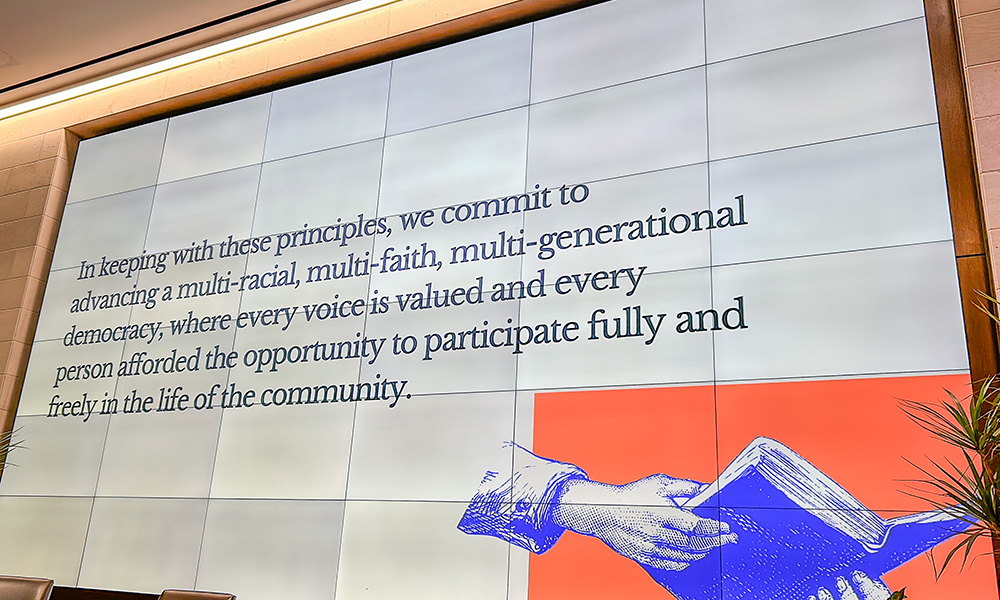
The core pledge to which all signers of the public letter were asked to commit themselves is displayed at the two-day conference in Washington, D.C., called "Test of Faith: A Summit to Defend Democracy," hosted by the Center on Faith and Justice at Georgetown University. (David DeCosse)
At the "Test of Faith" conference, Hollenbach noted the dramatic effect of these doctrinal changes on the widespread Catholic support for democratic change in the 1980s and 1990s in countries like the Philippines and Poland.
But we face a more ambivalent Catholic democratic landscape now. The doctrinal support remains strong. The synodal process brings democratic practices into a once-pervasively hierarchical church. But rearguard groups remain nostalgic for an authoritarian Catholic past.
Four key threats to democracy
In any case, the "Test of Faith" letter discusses four specific threats to democracy in light of paired Christian convictions:
- The "equal value and worth before God" of every human being, the document argues, provides the justification for rejecting "any attempt to limit, suppress, intimidate, or subvert equal participation in our democracy" via such practices as inhibiting voter registration and threatening poll workers.
- The Christian conviction that peacemaking is a revered practice that participates in a special way in the divine life ("Blessed are the peacemakers") and the commandment of Jesus to love your enemy both stand as sharp challenges to the "rising tide of violent language and behaviors" coursing through our political life.
- The promise of Jesus that the "truth shall set you free" is an abiding prophetic contrast to the flood of lies coming from political candidates, huge television networks, and social media posts.
- The conviction that the Gospel advances "through divine grace and human persuasion" comes with a respect for conscience and a recognition of pluralism, the letter says. In turn, it notes, such commitments require the repudiation of "the tenets of Christian Nationalism and the idea that Christians or Christianity should hold a place of privilege and power in our nation's governance."
At the conference, the threat of Christian nationalism came under sharp scrutiny. Professor Kristin Kobes Du Mez, author of Jesus and John Wayne: How White Evangelicals Corrupted a Faith and Fractured a Nation, described the problematic "us-them" binary behind such a reach for privileged political power: "God is on our side and so the end justifies the means."
But, she argued, this mode of thinking contradicts the Christian claim that "sin runs through every heart" — a datum that clouds the use of easy binaries and that Protestant theologians like Reinhold Niebuhr have argued especially applies to those who are adamant that God is on their side.
The letter and conference also grappled extensively with the Christian implications of the challenge of race and democracy. For starters, Christian nationalism, many speakers argued, is in the United States best understood as white Christian nationalism.
'Instead of polarization, we have to talk about what substantively we are defending,' said Robert Jones of the Public Religion Research Institute.
Professor Samuel Perry, co-author of The Flag and the Cross: White Christian Nationalism and the Threat to American Democracy, argued that at the root of our current challenges is the nationalist conviction that the country "primarily belongs to white Christians." This conviction is perversely nurtured, Perry added, by the widespread assumption that to be Christian means to be white.
Amid the news of widespread lying by many Christians about Haitian immigrants in Springfield, Ohio, Barbara Williams-Skinner of Faiths United to Save Democracy brought home to the conference the implications for African Americans and other minorities of such racial perversions of Christianity and democracy.*
"Democracy is about who has a right to be here," said the African American activist. "It's not just bad if democracy fails but it may also mean that we may not be here."
Christianity is a religion of word and deed, of faith and works. And throughout the conference, numerous speakers addressed the challenge of taking action to defend democracy and sustain hope. Du Mez said that the letter could help many evangelical Christian moderates who now face "enormous pressure" to conform to the hard right turn of the white evangelical world.
Kessley Janvier, a Georgetown University senior, said that Gen Z was not apathetic about politics but was "disappointed and frustrated." She demanded a seat at the political table for her generation and said: "People I organize with give me a lot of hope."
Campbell, who is now working with the group Understanding US, argued that hope about a democratic future is best understood as a community virtue learned in as local a way as possible. Of late, she has made a point of speaking about social justice concerns like democracy at independent bookstores in small towns around the country.
Finally, Robert Jones, the president and founder of the Public Religion Research Institute, warned against characterizations of our democratic predicament that diminish the importance of action. "We're confusing ourselves by defining the problem as polarization," he said. "Instead of polarization, we have to talk about what substantively we are defending."
Jones, the author of The Hidden Roots of White Supremacy and the Path to a Shared American Future, added: "There's this group that's attacking the foundations of our country and they have to be defeated."
*This article has been edited to insert two paragraphs that were inadvertently dropped when the online post was created.
